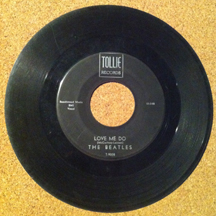“Love Me Do” is the Beatles’ first single, backed by B-Side “P.S. I Love You”. When the single was originally released in the United Kingdom on 5 October 1962, it peaked at No. 17; in 1982 it was re-promoted (not re-issued, retaining the same catalogue number) and reached No. 4. In the United States the single was a No. 1 hit in 1964. In 2013, recordings of the song that were published in 1962 entered the public domain in Europe. (More from Wikipedia)
One of my favorite Beatles songs, “Tomorrow Never Knows” is the first of their songs to use flanging; though by the time of its release in August 1966, Wikipedia reports that almost every song on their album Revolver had been subjected to flanging.
Anthology 2 includes the first take of “Tomorrow Never Knows”, and the liner notes give the history of this groundbreaking recording (although it is the final track on Revolver, it is actually the first song that the band worked on after taking off the first three months of 1966): "Clearly refreshed, and full of yet more innovative ideas, they conveyed at EMI Studios on 6 April [1966] and began work on their seventh album, Revolver, with what turned out to be the closing and most progressive number, ‘Tomorrow Never Knows’. Here was Beatles music the like of which had never before been heard . . . or made. Here was a dramatic new direction for a musical form that was ceasing to be ‘pop’ and developing into ‘rock’. Here was a thrilling orgy of sound, all the more inventive for being made within the confines of 1966 four-track technology, less reliant on melody but focusing more on the conveyance of mind-pictures on to tape. ‘Tomorrow Never Knows’ is all of this in a single piece of music, the released version (Take 3) being as stunning now as it was 30 years ago. Recording under its working title, ‘Mark I’, Take 1, issued here for the first time, is notably different but, in its own way, just as compelling. The Beatles’ music had indeed come a long way in the four years since ‘Love Me Do’.”
(July 2015)















